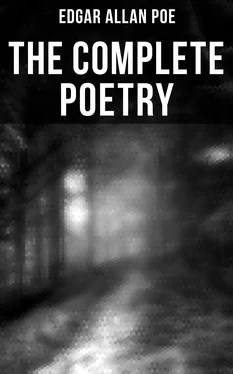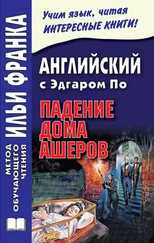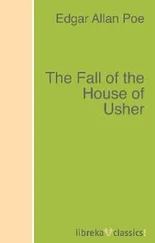On this very night of last year That I journeyed—I journeyed down here— That I brought a dread burden down here! On this night of all nights in the year, Ah, what demon has tempted me here? Well I know, now, this dim lake of Auber— This misty mid region of Weir— Well I know, now, this dank tarn of Auber,— This ghoul-haunted woodland of Weir."
Table of Contents
I saw thee once—once only—years ago:
I must not say how many—but not many. It was a July midnight; and from out A full-orbed moon, that, like thine own soul, soaring, Sought a precipitate pathway up through heaven, There fell a silvery-silken veil of light, With quietude, and sultriness and slumber, Upon the upturn'd faces of a thousand Roses that grew in an enchanted garden, Where no wind dared to stir, unless on tiptoe— Fell on the upturn'd faces of these roses That gave out, in return for the love-light, Their odorous souls in an ecstatic death— Fell on the upturn'd faces of these roses That smiled and died in this parterre, enchanted By thee, and by the poetry of thy presence. Clad all in white, upon a violet bank I saw thee half-reclining; while the moon Fell on the upturn'd faces of the roses, And on thine own, upturn'd—alas, in sorrow! Was it not Fate, that, on this July midnight— Was it not Fate (whose name is also Sorrow), That bade me pause before that garden-gate, To breathe the incense of those slumbering roses? No footstep stirred: the hated world all slept, Save only thee and me—(O Heaven!—O God! How my heart beats in coupling those two words!)— Save only thee and me. I paused—I looked— And in an instant all things disappeared. (Ah, bear in mind this garden was enchanted!) The pearly lustre of the moon went out: The mossy banks and the meandering paths, The happy flowers and the repining trees, Were seen no more: the very roses' odors Died in the arms of the adoring airs. All—all expired save thee—save less than thou: Save only the divine light in thine eyes— Save but the soul in thine uplifted eyes. I saw but them—they were the world to me. I saw but them—saw only them for hours— Saw only them until the moon went down. What wild heart-histories seemed to lie unwritten Upon those crystalline, celestial spheres! How dark a woe! yet how sublime a hope! How silently serene a sea of pride! How daring an ambition! yet how deep— How fathomless a capacity for love! But now, at length, dear Dian sank from sight, Into a western couch of thunder-cloud; And thou, a ghost, amid the entombing trees Didst glide away. Only thine eyes remained. They would not go—they never yet have gone. Lighting my lonely pathway home that night, They have not left me (as my hopes have) since. They follow me—they lead me through the years. They are my ministers—yet I their slave. Their office is to illumine and enkindle— My duty, to be saved by their bright light, And purified in their electric fire, And sanctified in their elysian fire. They fill my soul with Beauty (which is Hope), And are far up in Heaven—the stars I kneel to In the sad, silent watches of my night; While even in the meridian glare of day I see them still—two sweetly scintillant Venuses, unextinguished by the sun!
Table of Contents
It was many and many a year ago,
In a kingdom by the sea,
That a maiden there lived whom you may know
By the name of Annabel Lee;
And this maiden she lived with no other thought
Than to love and be loved by me.
I was a child and she was a child, In this kingdom by the sea: But we loved with a love that was more than love— I and my Annabel Lee; With a love that the winged seraphs of heaven Coveted her and me. And this was the reason that, long ago, In this kingdom by the sea, A wind blew out of a cloud, chilling My beautiful Annabel Lee; So that her highborn kinsmen came And bore her away from me, To shut her up in a sepulchre In this kingdom by the sea. The angels, not half so happy in heaven, Went envying her and me— Yes!—that was the reason (as all men know, In this kingdom by the sea) That the wind came out of the cloud by night, Chilling and killing my Annabel Lee. But our love it was stronger by far than the love Of those who were older than we— Of many far wiser than we— And neither the angels in heaven above, Nor the demons down under the sea, Can ever dissever my soul from the soul Of the beautiful Annabel Lee. For the moon never beams without bringing me dreams Of the beautiful Annabel Lee; And the stars never rise but I see the bright eyes Of the beautiful Annabel Lee; And so, all the night-tide, I lie down by the side Of my darling, my darling, my life and my bride, In her sepulchre there by the sea— In her tomb by the side of the sea.
Table of Contents
For her this rhyme is penned, whose luminous eyes,
Brightly expressive as the twins of Leda,
Shall find her own sweet name, that, nestling lies
Upon the page, enwrapped from every reader.
Search narrowly the lines!—they hold a treasure
Divine—a talisman—an amulet
That must be worn at heart . Search well the measure— The words—the syllables! Do not forget The trivialest point, or you may lose your labor! And yet there is in this no Gordian knot Which one might not undo without a sabre, If one could merely comprehend the plot. Enwritten upon the leaf where now are peering Eyes scintillating soul, there lie perdus Three eloquent words oft uttered in the hearing Of poets by poets—as the name is a poet's, too. Its letters, although naturally lying Like the knight Pinto—Mendez Ferdinando— Still form a synonym for Truth—Cease trying! You will not read the riddle, though you do the best you can do.
(To discover the names in this and the following poem, read the first letter of the first line in connection with the second letter of the second line, the third letter of the third line, the fourth, of the fourth and so on, to the end.)
Table of Contents
"Seldom we find," says Solomon Don Dunce,
"Half an idea in the profoundest sonnet.
Through all the flimsy things we see at once
As easily as through a Naples bonnet—
Trash of all trash!—how can a lady don it? Yet heavier far than your Petrarchan stuff— Owl-downy nonsense that the faintest puff Twirls into trunk-paper the while you con it." And, veritably, Sol is right enough. The general tuckermanities are arrant Bubbles—ephemeral and so transparent— But this is , now—you may depend upon it— Stable, opaque, immortal—all by dint Of the dear names that lie concealed within't.
(See comment after previous poem.)
Table of Contents
Because I feel that, in the Heavens above,
The angels, whispering to one another,
Can find, among their burning terms of love,
None so devotional as that of "Mother,"
Therefore by that dear name I long have called you—
You who are more than mother unto me,
And fill my heart of hearts, where Death installed you,
In setting my Virginia's spirit free.
My mother—my own mother, who died early,
Was but the mother of myself; but you
Are mother to the one I loved so dearly,
And thus are dearer than the mother I knew
By that infinity with which my wife
Was dearer to my soul than its soul-life.
Table of Contents
Thank Heaven! the crisis—
The danger is past,
And the lingering illness
Is over at last—
And the fever called "Living"
Читать дальше












